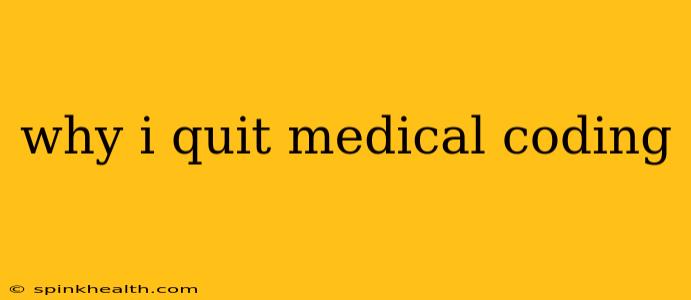Why I Quit Medical Coding: A Story of Burnout and Rediscovering Myself
The fluorescent lights hummed a monotonous tune, a soundtrack to my days spent hunched over a computer screen, deciphering medical jargon. For five years, I was a medical coder, a vital cog in the healthcare machine. I took pride in my work, meticulously translating doctor's notes into alphanumeric codes that insurance companies understood. But beneath the surface, a quiet discontent brewed, eventually erupting into a full-blown decision to quit. This is my story.
Initially, the work was engaging. The challenge of understanding complex medical terminology, the satisfaction of correctly identifying codes, the knowledge that my work contributed to patient care – these aspects fuelled my passion. I felt a sense of purpose, a feeling that I was making a difference. But gradually, the cracks began to appear.
The Crushing Weight of Volume and Deadlines:
The relentless pressure of meeting daily quotas chipped away at my enthusiasm. It wasn't just about accuracy; it was about speed. The constant rush to process more and more charts, often with incomplete or illegible documentation, created a stressful and unsustainable work environment. This pressure, coupled with the potential for costly errors, led to constant anxiety. How can medical coding be so demanding? It's because the system itself is often flawed, demanding perfection while providing inadequate resources and support.
The Emotional Toll of Dealing with Sensitive Information:
What are the downsides of being a medical coder? One significant downside is the constant exposure to sensitive patient information. Day after day, I read about illnesses, injuries, and even deaths. While I remained professional, the cumulative effect was a gradual erosion of my emotional well-being. The emotional weight of these stories, coupled with the pressure of the job, became too much to bear.
The Lack of Growth and Advancement Opportunities:
Is medical coding a good career path long term? For me, the answer was ultimately no. While there was a certain level of skill involved, the lack of career progression was disheartening. The opportunities for advancement were limited, and the pay didn't reflect the complexity and responsibility of the work. I felt stuck in a rut, with no clear path to professional growth.
The Search for Meaning Beyond the Codes:
The final straw came when I realized I was losing myself in the work. The job had become all-consuming, leaving little time or energy for my personal life and passions. I yearned for something more fulfilling, a career that would align better with my values and aspirations. Why did you leave your medical coding job? Ultimately, it wasn't just about the stress or the lack of advancement. It was about a deep-seated need to find meaning and purpose beyond the numbers and codes.
Leaving medical coding was a difficult but necessary decision. It wasn't a spur-of-the-moment choice, but a culmination of years of accumulated stress, dissatisfaction, and a growing awareness of my need for a more fulfilling path. Since then, I've embarked on a new journey, and while it's been challenging at times, I feel a sense of relief and renewed purpose that I hadn't experienced before. My experience serves as a reminder that prioritizing our well-being and pursuing a career that aligns with our values is crucial for long-term happiness and success.

